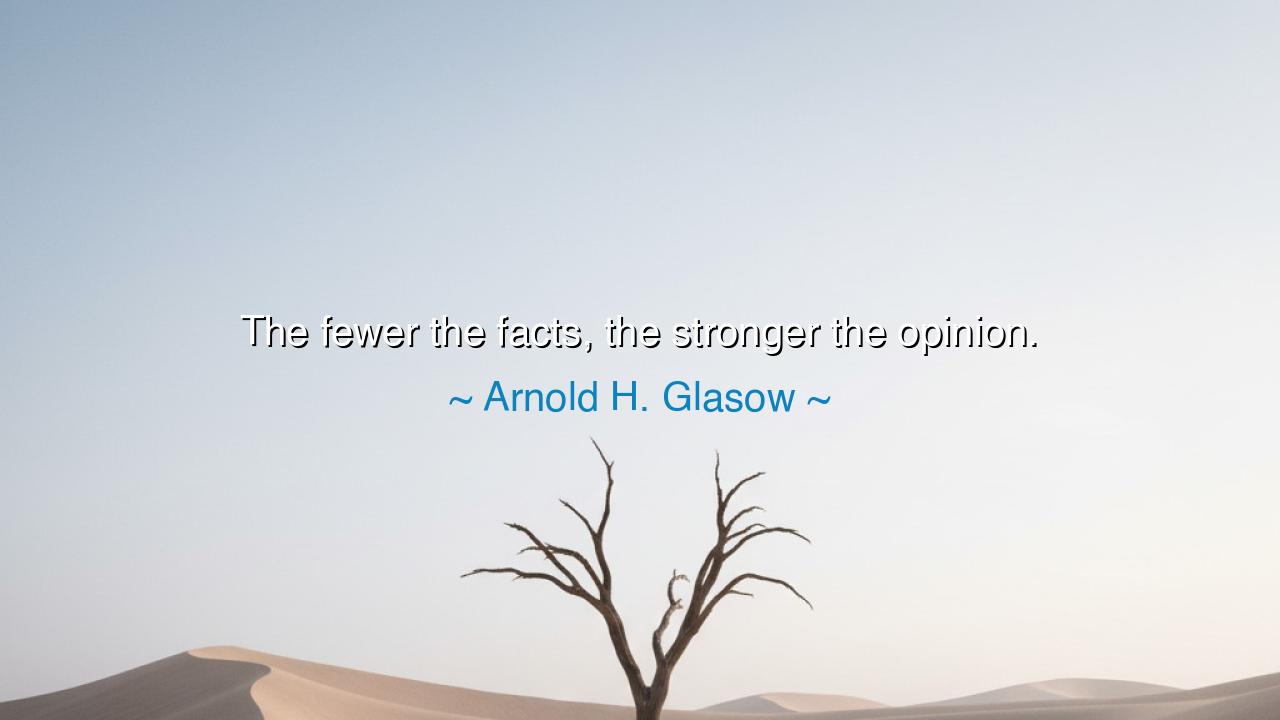
The fewer the facts, the stronger the opinion.






Arnold H. Glasow, with the sharp wit of a sage who saw through human folly, once declared: “The fewer the facts, the stronger the opinion.” These words cut deep, like a sword cleaving arrogance from wisdom. For he reveals the strange paradox of the human spirit: that where knowledge is scant, conviction often burns hottest. The mind, empty of facts, hungers to fill the void, and too often it fills it not with truth but with certainty born of ignorance.
The ancients understood this danger. Socrates himself warned against the illusion of knowledge, teaching that the wisest man is he who knows that he does not know. Yet throughout history, men of little learning have raised their voices the loudest, while those who carried the burden of true understanding spoke with humility. Glasow’s saying is a mirror, reflecting our tendency to grasp for certainty when the ground beneath us is unstable, to build castles of opinion where the stones of fact are few.
Consider the tale of Galileo Galilei. When he revealed through his telescope that the heavens were not fixed and perfect, but full of moons and movement, the world resisted him. Those who had never peered through the glass, who held no facts in their hands, declared with furious opinion that Galileo was wrong. They clung to the earth-centered cosmos not because they knew it to be true, but because their ignorance demanded certainty. Galileo, who had facts, spoke carefully; his opponents, who had none, roared with confidence.
This pattern has repeated across the ages. When Charles Darwin unveiled the theory of evolution, he did so with painstaking evidence, gathered from years of travel, study, and reflection. Yet his critics, many of whom never studied nature at all, thundered against him with unwavering opinion. The fewer the facts they possessed, the stronger their voices became. Such is the folly of man: ignorance often speaks in tones of thunder, while knowledge whispers with humility.
Yet this truth is not only a warning about history—it is a warning for our daily lives. How often do we see men and women quarreling with great heat over matters they scarcely understand? In politics, in faith, in daily disputes, the strength of an opinion often runs inverse to the weight of facts. The loudest are not the wisest, but those most afraid of silence, most unwilling to admit they do not know. Glasow’s words remind us to measure not the volume of a voice, but the depth of its foundation.
What lesson, then, must we draw? That we must not be seduced by the strength of opinion, either in others or in ourselves. Let us ask: “Upon what facts does this stand?” If the answer is little, let us treat the claim with caution. If in our own hearts we feel certainty rising without knowledge to anchor it, let us be humble and seek truth before we speak. For true wisdom is not in winning arguments, but in aligning our thoughts with reality.
So I say unto you, seekers of truth: let your opinions be few, but your facts be many. Do not fear to say, “I do not know,” for that is the first step to knowledge. Do not despise those who speak loudly, but weigh their words upon the scales of truth. And in your own life, strive to gather more facts than opinions, more light than heat, more wisdom than noise. For Glasow has shown us the path: when facts are absent, opinions roar—but when truth is present, wisdom speaks with quiet strength.






AAdministratorAdministrator
Welcome, honored guests. Please leave a comment, we will respond soon